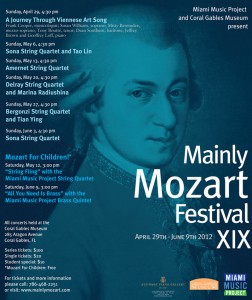
Mainly Mozart and an opera that rebukes the Holocaust
This weekend coming up is a good one for music, as a large chamber music festival gets under way Sunday, the same day a children’s choir performs a remarkable opera that is at once an anti-bullying statement and a poignant reminder of the Holocaust.
The Mainly Mozart Festival, now in its 19th year, is situated this time around at the new Coral Gables Museum, which opened last year. Three of the leading string quartets in the area will be on the bill, and five of the festival’s six concerts will in fact contain the music of Mozart.
This Sunday, some of the area’s best-known singers open the festival with a program of Viennese art song. Mezzo Misty Bermudez of Seraphic Fire and tenor Tony Boutté of Arcanum and the University of Miami are on the program, as are baritone Dean Southern and soprano Susan Williams. Musicologist Frank Cooper will provide some historical background, and pianists Jeffrey Brown and Geoffrey Loff will accompany the singers. The program includes excerpts from the Schubert song cycle Die Schöne Mullerin and the Rückert-Lieder of Mahler and the Liebeslieder Waltzes (Op. 52) of Brahms.
On May 6, the Sona String Quartet (composed of teachers from the Miami Music Project) is joined by pianist Tao Lin for the one-movement Mahler Piano Quartet (a beautiful student work) and the Piano Quintet of Shostakovich. The quartet also will play Mozart’s Hunt Quartet (No. 17 in B-flat, K. 458).
The FIU-based Amernet String Quartet is up May 13 with the Prussian Quartet (No. 22 in B-flat, K. 589) of Mozart, on a program with the Third Quartet (in E-flat minor, Op. 30) of Tchaikovsky and the moody Quartettsatz of Schubert. Pianist Marina Radiushina guests with the Delray String Quartet on May 20 in a pocket version of the Mozart Piano Concerto No. 12 (in A, K. 414), and the quartet plays Ken Fuchs’ Quartet No. 5 (written for the quartet) and the Tango Ballet of Astor Piazzolla.
On May 27, the Bergonzi String Quartet welcomes the fine pianist Tian Ying for a new arrangement of Gershwin’s Rhapsody in Blue on a program with the Adagio and Fugue (in C minor, K. 546) of Mozart and the String Quartet of Maurice Ravel. The series concludes June 3 with the Sona String Quartet in an arrangement of Mozart’s Sinfonia Concertante for violin and viola, in which they will be joined by bassist Brian Powell and violist John Posadas. Also on the program is the Quartet No. 1 of Alexander Zemlinsky and the Concertino for string quartet of Stravinsky.
All the concerts are at 4:30 p.m. Sunday, and cost $20 apiece, or $100 for the series. Call 786-468-2251 for more information.
The other key event Sunday is the Miami Children’s Chorus performance of Brundibar, a brief opera for children written originally for a Prague Jewish orphanage by composer Hans Krasa, who studied with Arnold Schoenberg and Albert Roussel.
With the rise of the Nazis and their takeover of the Czech lands in 1938, Krasa was sent to the Terezin concentration camp, which became a sort of Potemkin village of Jewish incarceration during the war. Its residents were allowed to pursue a semi-normal existence for propaganda purposes, but most were ultimately sent to the gas chambers of Auschwitz.
Brundibar has the unique distinction of having been performed 55 times in the camp, notably for a film taken by observers of the international Red Cross. The girl who sang the role of the Cat in the opera, Ela Weissberger, was one of the only people to survive the camp, and I had the pleasure of talking to her late last year in conjunction with a performance of the opera by the Young Singers of the Palm Beaches.
“It was, for us, very meaningful because, first of all, we were seeing people that enjoyed the show. They applauded, they sang with us,” she said in October.
The opera is about two children in a village who need to buy milk for their sick mother but have no money. Seeing the organ grinder Brundibar busking for coins in the square, they decide to sing for their badly needed supper, but Brundibar chases them away. The children, a brother and sister, are helped then by a sparrow, a cat and a dog, who get all of the children in the village to form a chorus. Brundibar attempts to steal the money they’ve raised, but is run off, and the children claim victory.
“This little opera is a symbol for freedom. That we were free, even in those very, very bad times, to forget, for a couple minutes, our very, very difficult lives as children. To be free and to sing good music,” she said. [Weissberger can be seen in this footage from the Red Cross film in 1944, showing the final chorus of the opera. She’s to the right of the boy playing Brundibar, who did not survive.]
The Miami Children’s Chorus, under the direction of Timothy A. Sharp, performs the piece at 5 p.m. Sunday at Temple Emanu-El on Miami Beach. In addition to its status as a witness document with a good moral lesson, it’s also a fine piece of theater with a charming, semi-spiky score that shows how adeptly Krasa absorbed the neoclassic language of his time.
Tickets for the concert are $20 for adults, $10 for students. Call 305-662-7494 for more information.
Recent Content
-
Artsarticle ·
-
Artsarticle ·
-
Artsarticle ·
